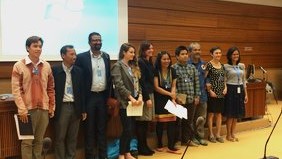The lack of respect for the human rights of asylum seekers, refugees, migrant workers, and indigenous people in Thailand remains concerning. The country is now recognised as a global centre for human trafficking: it is a country of destination, origin, or transition for many men, women, and children, many of whom are subjected to forced labour. An estimated 450,000 stateless people live in its territory, including many Rohingya people, who have fled persecution in Myanmar.
Thailand was reviewed on May 11th 2016, by the UN Human Rights Council’s Universal Periodic Review (UPR), in Geneva. This was Thailand’s second UPR review. In collaboration with the Marist International Solidarity Foundation (FMSI), Franciscans International (FI) prepared a joint submission, based on information shared by human rights defenders in the country with whom FI and FMSI partner regularly. The report highlighted key human rights violations with regards to asylum seekers, refugees, migrant workers, indigenous peoples, minorities, and victims of trafficking.
In addition to preparing the submission, FI joined partners in hosting a conference at the United Nations during which members of Thai civil society were able to give first hand information about the violence and lack of protection suffered from human rights defenders. They shared stories of disappearances and killings of human rights defenders with no real investigation from the authorities, forced evictions of indigenous people living in forests, and growing harassment of those who express disagreement with the government. Panelists noted that more than ten countries called for Thailand to ensure concrete measures to protect human rights defenders; and underlined the importance for Thai authorities to ensure the implementation of these measures.
Participants of the conference released a statement reflecting on the UPR and making further recommendations for the Thai government regarding the implementation of measures to protect human rights defenders.

